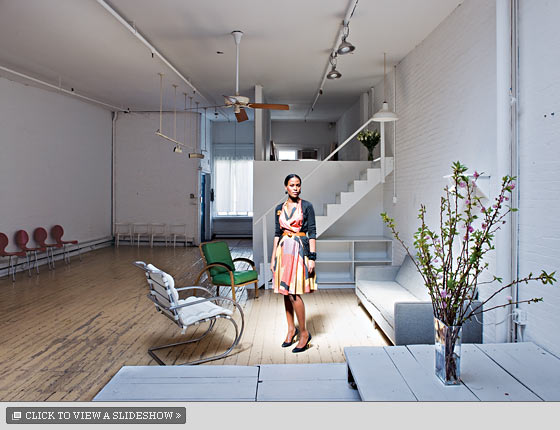
When she was a model, Nicola Vassell lived in every corner of the city. “Upper West Side. Upper East. Park Slope. East Village. Hell’s Kitchen. Union Square,” she says. “I know I’m forgetting a few.” Four years ago, after quitting the modeling business in favor of the art world—she is now a director at Deitch Projects in Soho—Vassell had a stroke of New York luck. Her ex-boyfriend’s childhood babysitter, now a Realtor, clued her in to a loft on Greene Street; an opera singer who had lived in the space for decades was moving out.
The all-white loft with east- and west-facing windows has no revamped kitchen, no rain showers or soaking tubs or wine cellar. And that’s exactly what Vassell loves about it. “I think there’s an exquisite charm to the oldness of the space,” she says. “I haven’t touched a thing.”
She hasn’t even added much furniture; years of moving taught her to go light on possessions. “This was really for peace of mind. I wanted to feel weightless,” she says. “I brought clothes and shoes. That’s it.” There is nothing in her bedroom except for a mattress and box spring on the floor and a TV propped up on milk crates. “There’s something absurd and slightly Dada about using something so banal. I fell in love with the absurdity. There’s a symphony to it.”
Part of Vassell’s intention for the space was to fill it only with the bare necessities. “The challenge was to see what I really, truly needed, not buy for the sake of having.” At the same time, she wanted a place where she could invite her many friends for “salon-type evenings” that involve mini art shows and music and catered food (Vassell doesn’t have much interest in cooking).
In her living room, she has mostly chairs. A friend was getting rid of his collection of mid-century pieces, including a set of orange-red Knoll chairs, a minimal gray couch, and a white Mies van der Rohe chair; the white Hans Wegner chairs came from her ex’s parents. Most of the time guests can be found sprawled across the raised wood platform—a built-in piece that protects a trapdoor. “I have to repaint it twice a year because of everyone’s footprints,” she says.
For a person who spends her days around enormous canvases and installations, the airiness and emptiness are an intentional counterbalance. Vassell carefully curates her few pops of color and pattern. Her side table is made from a psychedelic black-and-white round top she found discarded on Spring Street. “It reminded me of the Op-Art artist Victor Vasarely,” she says. It sat around for months until Vassell decided to mount it on top of a cardboard box; it now holds glasses and hors d’oeuvre.
A white bookcase holds a single red square by artist Richard Tuttle she got at Art Basel Miami. The loudest objects in the place are a row of jackets that hang on pegs by Vassell’s front door. One of them is printed with Shepard Fairey’s image of Obama. Vassell would like to add more art to the mix. It’s just that the whiteness of the walls seem to overwhelm everything she hangs. “Until I can afford those megaworks,” she says, “the space dominates.”

Living Room
Vassell hosts “mini-salons” at her loft for artist friends, neighbors, and friends from her previous life in the fashion world. She keeps her living room open and “empty, empty, empty!” The stairs lead to a guest room where friends stay and pieces of art are stored.
All photographs by Dean Kaufman

Vassell uses a cardboard box as a table base.

Aurel Schmidt, an artist represented by Deitch Projects, switches into her biking shoes post-party.

Vassell’s minimalist bedroom.

A row of pegs is the coat closet.

One guest, fashion designer Malcolm Harris.

An oval mirror balanced precariously on a block of wood functions as décor.

Enormous flowers (shown next to Vassell) always punctuate the space.
